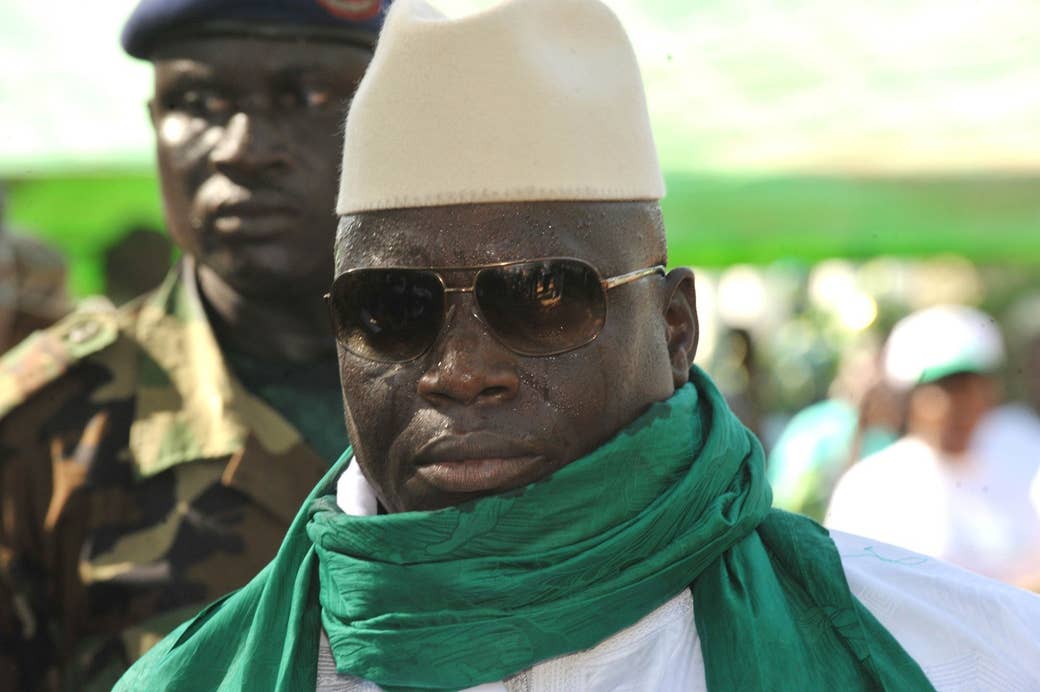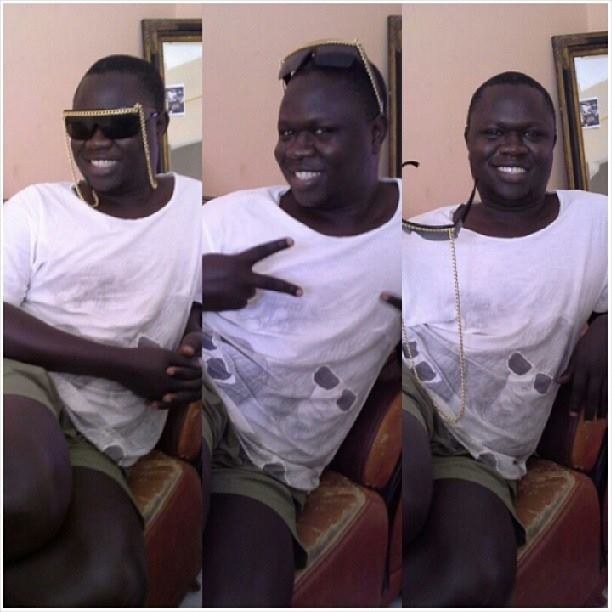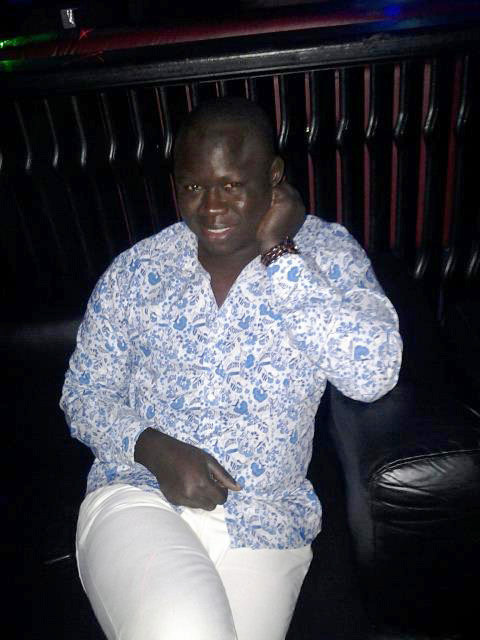
After more than six months in prison, several rounds of torture, and two hospitalizations for his injuries, Alieu Sarr fled his country by boat under cover of night late last month.
Sarr was arrested last fall, alongside at least 15 others, by security forces controlled by Gambian President Yahya Jammeh, one of the world’s most ruthless dictators. Jammeh had launched a new witch hunt in the months following the August adoption of a law that would punish “aggravated homosexuality” with life in prison.
Most of those with whom he was arrested were released after short detentions, but Sarr and two other men were held to face charges. They were paraded before the media by security officials as Jammeh repeatedly made public pledges to execute LGBT people, including promising in a May speech to slit the throats of homosexuals. “No one will ever set eyes on you again, and no white person can do anything about it,” Jammeh vowed.
In a phone interview from Senegal’s capital, Dakar, Sarr told BuzzFeed News he was sure he would die, as dozens reportedly have while detained by the National Intelligence Agency. But in a final court hearing on July 28, the man he says tortured him and then fabricated a confession denied any knowledge of the investigation. Sarr and another were released; the third is out on bail and still facing charges.
Sarr said his acquittal felt like God had directly answered the prayers he would recite every time he went to court. But his tale — from mysterious arrest to arbitrary acquittal — is a parable of just how tenuous life is for the roughly 2 million people who have lived under Jammeh’s capricious and iron-fisted rule since 1994.
It also shows how lives are ruined even when people like Sarr survive police brutality and a corrupt judiciary. Sarr arrived in Dakar, the nearby capital of Senegal, just as eight people were sentenced there for homosexuality, including one well-known journalist. Sarr, who is sheltering with a friend who fled as soon as he learned Sarr had been arrested, is afraid to even go outside.
“Senegal and Dakar are the very same” as in the Gambia, he said. “My life is not safe in the whole of Africa.”

Sarr was in a taxi heading home from dinner with a friend on the night of Nov. 9 when two officers pulled him out of the vehicle. He didn’t know why he had been detained until he arrived at the headquarters of the National Intelligence Agency, the security force that reports directly to Jammeh.
“My life is not safe in the whole of Africa.”
“We know you are homosexual — everyone told us about you,” he remembered the agents telling him. He said they gave him a choice: “If you want [us] to deal with you easily, you will call the names of homosexuals, because you know their names and we want to get them all.”
This was not the first time Sarr had been arrested. He was taken into custody back in 2012, the last time there was a mass arrest of people alleged to be LGBT, which began with a raid on a party. Sarr faced harassment — including from his family and people on the street — so relentless in the years since that he was forced to shut down his small business selling shrimp from a bucket in a local market.
Sarr’s lawyer told BuzzFeed News that a security agent who testified at Sarr’s trial said he was arrested under “directives that certain people were engaged in homosexual activity,” but declined to say where the directive had come from.
“Anybody who knows me in Gambia, they know that I am homosexual,” Sarr said. “Everyone [is] against me [because] they say that this is a Muslim country. It’s very hard for me.”
After he was arrested, Sarr said he was tortured between 2 a.m. and 4 a.m. every night for the next eight days. He described how officers would pin him to a table and beat him with a fan belt from a car, or beat his hands with a ruler. Exhausted from the ordeal, he said he finally told the officers “about my story,” but he refused to give them names of other gay people. He believed the stakes were life or death — there were rumors that anyone the security services caught “making the homosexual act” would be fed to crocodiles, Sarr said.
“They were trying to get it by my mouth. I told them I don’t know any homosexuals in the Gambia,” he said.
So the officers turned to his phone and his Facebook account, Sarr said. They claimed some of his contacts were boyfriends. They also found he was connected with Gambian dissidents now in exile, and they claimed he was giving information to Jammeh’s political enemies.
On Nov. 17, the interrogations ceased and he was transferred to a high-security wing at Mile 2 prison, which houses the most dangerous prisoners as well as prisoners in cases of special interest to the regime. Sarr was held in isolation most of the time, while continuing to bleed from internal injuries inflicted during his torture. When he was hospitalized for his injuries in January, he was held under heavy guard at the private block of the Edward Francis Small Teaching Hospital, where other prisoners had died under mysterious circumstances while in custody.
A witness, who asked not to be named out of fear of retribution from the Jammeh regime, told BuzzFeed News at the time about seeing Sarr coughing up blood in the hospital while repeating, “‘I know I’m going to die.”

Three weeks later, Sarr was sent back to prison, and then to the hospital again in April, where he stayed for two months. “I was bleeding in my mouth, in my nose. I was bleeding seriously,” Sarr said.
Sarr’s account is backed up by his lawyer, but it could not be independently verified. The Jammeh regime keeps a tight grip on information in the country — including arresting and allegedly assassinating journalists — and it has intensified security since a failed coup attempt this winter.
But human rights groups have documented similar cases.
Amnesty International first told BuzzFeed News in mid-November that it had received reports that police were running a “well organized operation” attempting to identify and arrest LGBT people. Fatou Camara, Jammeh’s former press secretary who became a human rights activist when forced into exile in 2013, said at the time that she had spoken to a source in the intelligence service who said the agency had compiled a list of 200 people targeted for arrest. According to one lesbian who fled to Senegal as the arrests began, in some cases police visited their homes in the company of a 17-year-old boy, the youngest arrested in the sweep, who they believe was tortured into naming others.
Even in a country where the regime has arbitrarily detained — or killed — scores of people, this wave of arrests was unusual. Since seizing power in 1994, Jammeh generally targeted political opponents, not specific minority groups. Also unusual was the fact that forces known as “Junglers” or “Black-blacks” (because they dress all in black and cover their faces), which are essentially Jammeh’s personal secret police feared for their role in tortures and disappearances, were involved directly in the roundup.
But as the United States and European powers pressed countries like Uganda to drop sweeping new laws criminalizing homosexuality, Jammeh appeared to see a political opportunity to curry favor internally by burnishing his Muslim bonafides and justify the Gambia’s increasing status as an international pariah. Just weeks after Uganda’s Constitutional Court struck down the newly adopted Anti-Homosexuality Act in August 2014, the Gambia adopted a law closely modeled on Uganda’s which included a life sentence for “aggravated homosexuality,” defined as including cases like when someone repeatedly has same-sex intercourse, when the accused is HIV positive, or when the accused has sex with a minor.
In December, Sarr and two others were formally charged with full media coverage, the apparent show trial that would be the culmination of Jammeh’s growing anti-LGBT campaign.
Nearly eight months after he was first arrested, Sarr’s case had its final hearing on July 28. By then he’d developed a special prayer he would recite before each hearing: “God, help me when Seedy Camara comes.” Camara was the officer Sarr said interrogated and beat him, and his testimony could put him away.
Sarr’s lawyer, Aji Kombeh Gaye, is still mystified about what happened when Camara took the stand that day. She told BuzzFeed News that Camara “refused to have anything to do” with the “confession” that prosecutors had submitted as evidence, which bore Camara’s signature as the officer who wrote it down.
“We don’t know why he turned around and denied it,” Gaye said.

Sarr and another person charged in the case, Morr Sowe, were immediately released. The case of a third person still facing charges from the sweep last fall, Modou Lamin Bittaye, is still pending. His family had been able to secure bail for him, and so his case was not moving with the same urgency of Sarr and Sowe, whose lawyers were trying to them get out of prison.
Sarr had been unable to work since his first arrest in 2012 and survived largely on gifts from human rights activists living in exile. This time, he could see no way to stay in the Gambia, and three days after he was released by the court in the capital of Banjul, he began his journey to Senegal. He posed as a fisherman and took a small boat out on the Atlantic Ocean, crossed into Senegalese waters, and then slipped ashore. He finally made it to Dakar, about 100 miles north of Banjul, two days after leaving the Gambia.
Once there, he was taken in by Amadou Jallow, another Gambian who had been arrested alongside Sarr in the 2012 sweep and fled to Senegal by car in November 2014 when he learned Sarr had been rearrested. Jallow was surviving by washing dishes at a neighborhood restaurant, even saving a little bit of money.
Jallow has since spent those savings on Sarr’s medical costs, he told BuzzFeed News. Sarr still has coughing and internal pain from the beatings, as well as some kind of rash that Jallow says look like chicken pox. Fatou Camara, the Gambian activist now living in the United States, has set up a fundraising campaign to help Sarr get treatment.
Jallow’s meager salary, just under $2 per day, now supports them both. With the recent arrests in Senegal of alleged homosexuals, they agree that it’s too dangerous for Sarr to be in public. “He’s too feminine,” Jallow said. “Whenever he goes out people know he’s gay.”
They are petitioning for asylum through the local office of the United Nations High Commissioner on Refugees with the hope that they will eventually be resettled someplace like the U.S. or Europe. But they have very little hope that will happen soon — they have heard rumors that some people wait 20 years in Senegal before being resettled.
“I want to do my life how I want to do my life … to be happy,” Sarr said. He hasn’t been happy since his first arrest in 2012, and now he feels imprisoned in the small compound where Jallow lives in Dakar.
“If I go outside, they say that this is [a] homosexual. That’s why I hide here, in one compound, till God comes to help me,” Sarr said.

